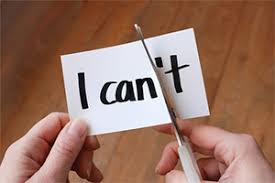How to Overcome Self-Limiting Beliefs
Dear Springboard:
I love my new job and the increased responsibilities. I’m learning a lot and I have more impact than before. But, my boss thinks I should be a speaker at an upcoming industry conference. It will be good for my career etc.
I’m terrified at the thought! I’m comfortable one-on-one and also in meetings if they aren’t too big. I’m not a public speaker. No way.
What do I do?
Sign me,
Happy in the Audience
Dear HinA:
We all make up stories about ourselves and what we are capable of.
The thing is sometimes they’re true and often they’re not.
What I’m hearing in your letter is a firm stake in the ground based on a self-limiting belief.
How do you know you aren’t a public speaker?
Let’s look at how beliefs can influence our lives. They make up our personality and our mindset. They are at the core of our identity and have a lot to do with the motivations fueling our behavior, our affiliations and the principles we care about.
Beliefs about ourselves are essentially what we assume to be true about us and our abilities. Self-limiting beliefs are assumptions that hold us back.
While there may be many forms of limiting beliefs, the basic message we tell ourselves is that we aren’t enough. It might sound like:
“I don’t have time. . . I’m not smart enough. . .
They’ll see through me. . . I could never do that.”
We’ve come to see ourselves in a certain way and, and what’s confounding, we’re very sure of it –with or without supporting evidence.
What’s more, we often use these self-limiting beliefs is in an effort to keep ourselves safe. If I believe I’d bomb as a public speaker, acting on that belief is keeping me from failing. It’s also keeping me from even trying and finding out.

Where do these messages come from? Family, friends, school, and life in general. Sometimes we just make them up. “My brother’s the athlete. My sister is the brain.”
Once introduced, we can allow these ideas to take root in our psyche. Years can go by and they get reinforced. We look for supporting evidence, and disregard any evidence to the contrary.
Here’s the rub. As Somerset Maugham said, “If you don’t change your beliefs, your life will be like this forever. Is that good news?”
So, what do you want? Do you want what you have now and nothing more? Or, do you want more professional success and personal fulfillment?
If you want more, the way through is to start with some increased self-awareness. Ask yourself where you are frustrated in your life, what you are tolerating, what aren’t you getting that you want, where do you feel stymied and denied?
Pick one of these frustrations – one you’ve been living with for a long time. Think about the assumptions that you hold to be true that prevent you from getting what you want.
Write them all down. Be honest and as thorough as you can. Then, gently demand to see the evidence that these assumptions are really valid.
If there isn’t good supporting evidence, be bold and take one step out of your comfort zone.
Start small.
Set yourself up for success.
When I think of you and public speaking, I wouldn’t recommend signing up as a key note speaker for an audience of 5,000!
How about hosting a Lunch and Learn session at your office; moving on to presenting material you know well to some small groups internally; and then graduating to a modest-sized break out session at a conference.
You might even ask a colleague to join you as a co-presenter. Having a partner can be reassuring.
To get a some traction here, think about a single specific limiting belief and seriously consider what would be possible if it were not true.
When people reflect on their lives, they usually have more regrets over missed opportunities than for actions taken and missteps.
While it may be a little uncomfortable, it will be worth it.
From the Watercooler
springboard

